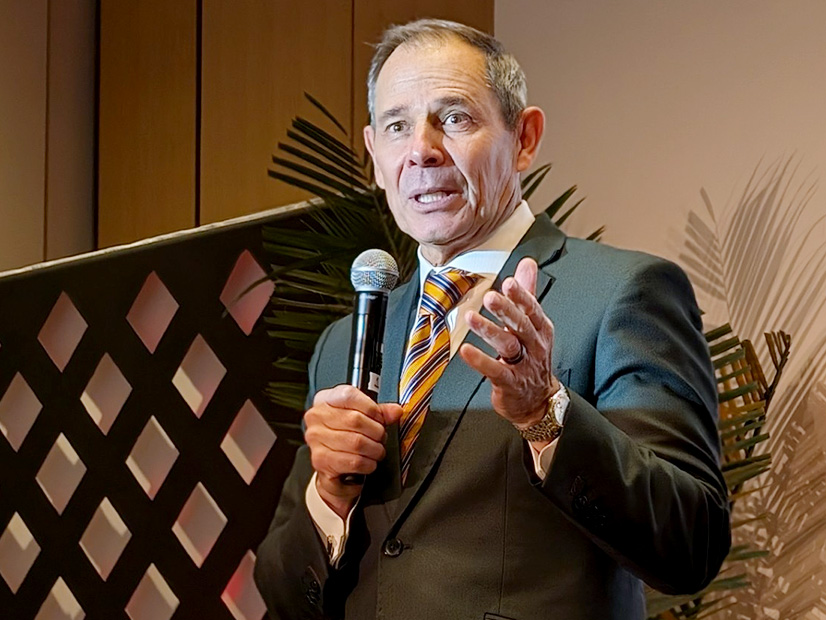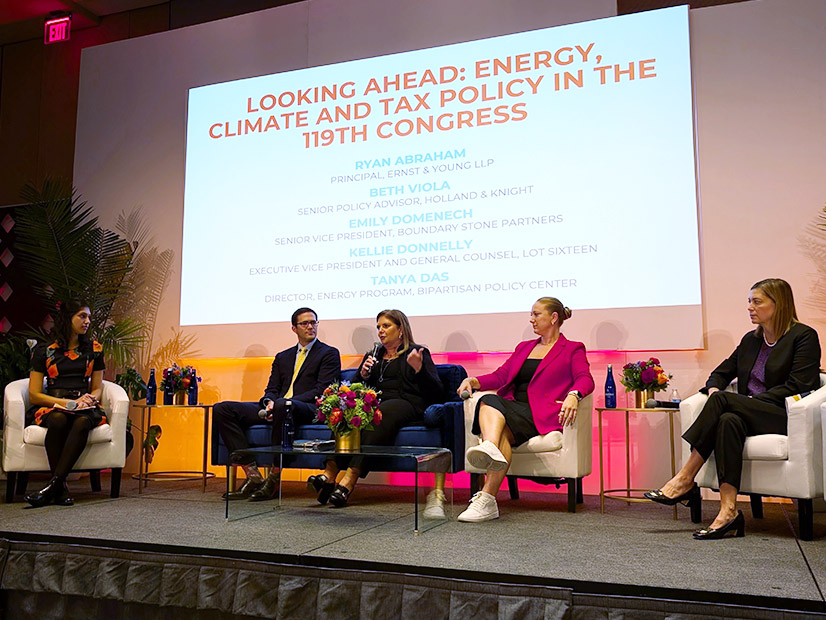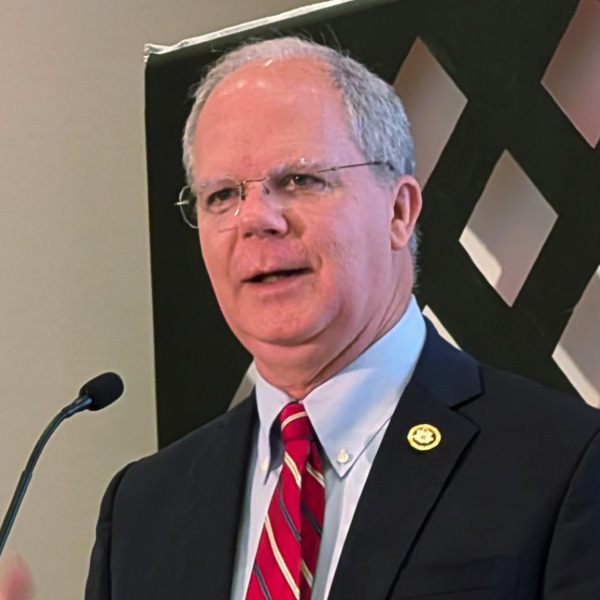
WASHINGTON ― Rep. John Curtis (R-Utah) had “some really good news and some bad news” on permitting reform for attendees at the National Clean Energy Week Policymakers Symposium held on Sept. 25-26.
“The good news is, everybody wants it,” Curtis said, speaking on the symposium’s second day. “The bad news is, everybody has a different definition of what that is … even within the Republican Party, the Democratic Party and then particularly between Republicans and Democrats.”
For some, streamlining and accelerating federal permitting processes is all about expanding and upgrading transmission, he said. For others, it’s about building new pipelines or mining for critical minerals.
“And so, we have some bills and proposals that are out there, and almost all of them have a lot of very good parts to them, but almost all of them are not comprehensive,” Curtis said. “So, what do we do? Do we take bits and pieces, or do we wait for a comprehensive thing that hits everything? And I don’t have a good answer to that.”
With a very close presidential election five weeks away, the fate of permitting reform and the Biden administration’s clean energy policies ― in particular, tax credits in the Inflation Reduction Act (IRA) ― were top of mind for attendees and speakers at the symposium, hosted by the center-right Citizens for Responsible Energy Solutions (CRES).
During the opening panel Sept. 25, for example, Ryan Abraham, principal at Ernst & Young, warned of a looming “fiscal cliff” facing lawmakers in the 119th Congress, pitting expiring tax cuts against clean energy tax credits.
The Tax Cuts and Jobs Act (TCJA) of 2017 expires next year, he said, and whether Republicans or Democrats control the White House or Congress, the outcome likely will be “tax increases for Americans and … it’s going to cost a lot of money to fix that.”
Should Republicans make a clean sweep of Congress and the White House, they likely would take aim at the IRA’s tax credits and incentives to pay for continuing the TCJA’s trillions in tax cuts, Abraham said. “There’s a lot of revenue there. Eliminating certain incentives, phasing out policies early; this has been one of [Republicans’] talking points.”
A Democratic sweep could see an even greater push on clean energy incentives. But divided government could result either in more uncertainty or more opportunities for bipartisan policies, Abraham and other panelists said.
Beth Viola, senior policy adviser at Holland & Knight, said her firm has a team that works exclusively with companies finalizing contracts for IRA funds with the Department of Energy and EPA.
With billions on the line, Viola said, “those clients are really anxious [about] what happens if we have [another] Trump administration. Are those dollars going to get put on hold? Are they going to be rescinded? … Just across the board, [there’s] this sense of uncertainty, and when you have industries that are putting up billions and billions to match the billions that this government is investing, it gives them a lot of pause.”
Both DOE and EPA have maintained, repeatedly, that once they finalize funding contracts, the IRA dollars are committed and cannot be clawed back, but Viola is less certain.
“This administration is pushing very hard right now to get as much [money] out the door before Jan. 21 as they can,” she said. “But the reality is, we very much expect [that] if [Donald] Trump is re-elected, that he’s going to come in and … pause and look at every single thing. It may be that they just slow everything down so that nobody gets those dollars or sees those dollars for a very long time, if ever.”
A Trump administration also might put a pause on the Treasury Department’s rollout of guidance on IRA tax credits, such as the still pending rules on the 45V clean hydrogen credits, Abraham said. “I can just see them putting a freeze on all guidance projects,” he said. “They’re going to want to take a fresh look at everything.”
Curtis was more optimistic about the fate of the IRA, pointing to the letter he and 17 other GOP representatives sent to House Speaker Mike Johnson (R-La.) in August arguing for the preservation of at least some of the tax credits, which have spurred investments and created jobs in their districts.
In response, Johnson had said that any GOP action on the IRA should use a scalpel rather than a sledgehammer, a statement that has generated pushback from more conservative Republicans.
How the GOP Talks Climate
With only one Democratic lawmaker on the agenda ― Rep. Scott Peters (D-Calif.), who canceled at the last minute ― the symposium essentially was a showcase for the House Republicans’ Conservative Climate Caucus, and its views on what bipartisan legislation should look like.
Curtis started the group in 2021 to find ways to get Republicans to talk about climate, he recalled, and with more than 80 members, it is the second largest GOP caucus in the House of Representatives.
But caucus members speaking at the symposium generally avoided talking about climate, instead stressing their support for clean air and water and preserving the environment while framing Democratic clean energy policies as radical or impractical.
Rep. Brett Guthrie (R-Ky.), a caucus member who hopes to replace retiring Rep. Cathy McMorris Rodgers (R-Wash.) as chair of the Energy and Commerce Committee, agreed that “less carbon is better” but that Democratic climate policies often are based on radical scare tactics or misinformation.
Pointing to California’s Advanced Clean Car II rule, mandating that all new light-duty vehicles sold in the state be zero-emission vehicles by 2035, Guthrie claimed the rule is “just incredibly disruptive; it’s incredibly inefficient, and in the end, does it really save what they say they’re trying to save? I think that’s questionable; so, why take those drastic steps?”
Emily Domenech, a former GOP House staffer and now senior vice president of Boundary Stone Partners, a lobbying firm, argued that Republicans always have supported energy research and development, the National Laboratories and “making sure we keep government out of the way of allowing people to innovate and build in the United States.”
What will be critical post-election is how these “fundamentally Republican ideas” are communicated to the public in the context of a divided Congress, she said.
The issues that could get stakeholders on both sides of the aisle to the table include, of course, permitting reform, as well as U.S. competitiveness with China and artificial intelligence, Domenech said.
AI has “brought a whole range of tech stakeholders to the table in the energy context and thinking about permitting,” she said. “For the first time, I’ve been meeting with folks in the tech space who said, ‘We really want to lean in on this issue, but we haven’t done it before.’
“Now [they] care about nuclear, and they care about fixing [the National Environmental Policy Act], and they care about coming to the table to make sure they can build and grow this infrastructure in the United States,” she said.
Curtis also brought the discussion back to permitting. “A lot of money in the IRA will never be spent if we don’t get permitting reform,” he said. “Worse than that, there is no path to 2050 — clean or unclean, either way — that meets our energy needs without permitting reform. People are seeing a lot of good discussions and healthy discussion about it, but nobody [has] come up with a bill that everybody can support.”





